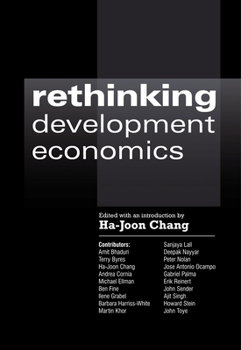Rethinking Development Economics
This title represents the most forward thinking and comprehensive review of development economics currently available.
Format:Paperback
Language:English
ISBN:1843311100
ISBN13:9781843311102
Release Date:June 2003
Publisher:Anthem Press
Length:544 Pages
Weight:1.80 lbs.
Dimensions:1.2" x 6.1" x 9.3"
Customer Reviews
2 ratings
Superb book on economics
Published by Thriftbooks.com User , 15 years ago
This is a most important book. Ha-Joon Chang, Assistant Director of Development Studies at Cambridge University, has edited this collection of 23 essays exploring development strategies. There are 19 contributors, mostly from Britain, but also from the USA, Norway, India, Holland and Italy. Part 1 presents overviews of economic development; Part 2 looks at different development experiences in Asia, Latin America, Africa and the former socialist countries. Part 3 studies structural and sectoral issues, Part 4 trade, industry and technology, Part 5 financial markets and corporate governance, Part 6 poverty and inequality and Part 7 institutions and governance. In the `golden age' of 1950-73, the world economy grew by 3% a year. By contrast, it did worse in the periods when neoliberalism held sway: between 1870 and 1914 it grew by 1-1.5%, and since 1980 it has grown by 1.5%. Neoliberalism has not brought the promised economic growth, but it has brought vast wealth for the few and falling living standards for the majority - arguably, what it was designed to do. Following liberalisation of finance and trade, capital inflows surge, there is massive speculation, a credit boom, asset bubbles and current account deficits, resulting in financial crises. 89 countries were worse off in 1996 than in 1986 (UN figure). Russia, for instance, suffered falling living standards, fewer jobs, more inequality, corruption and crime, capital flight and state collapse. The number of poor people rose from 2.2 million in 1988 to 57.8 million in 1995. By 2000, the economy was worse-equipped than at the end of the Soviet period. As Erik Reinert sums up, "Where industry is closed down, poverty enters." The problem is not `government failure' or `failed states' but a failed system. The capitalist model - Thatcherism - is now shattered. In a brilliant essay, Ilene Grabel, Associate Professor of International Finance at the University of Denver, advocates well-designed controls over international private capital flows [IPCFs], "Numerous recent cross-country and historical studies demonstrate conclusively that there is no reliable empirical relationship between the liberalisation of IPCFs in developing countries and performance in regards to inflation, economic growth or investment. More damaging to the neo-classical case is the fact that there is now a large body of unambiguous empirical evidence which shows that the liberalisation of IPCFs introduces and/or aggravates important problems in developing countries. For example, numerous studies find that liberalisation is strongly associated with banking, currency and generalised financial crisis. Other studies show that liberalisation is associated with an increase in poverty and inequality." She writes, "First, capital controls can promote financial stability and thereby prevent the economic and social devastation associated with financial crises. Second, capital controls can promote desirable types of investment and fina
A Graduate Student
Published by Thriftbooks.com User , 18 years ago
This book has revolutionized my understanding of economics of development in the sense that it provides irrefutable evidence against the neoliberal economics, the dominant economic doctrine of the 90s, and proposes sound alternatives to overcome the current development crises in developing countries. It is a must for anyone interested in development economics who wants to look beyond the orthodox theories and grasps the failure of neoliberal reforms that are sometimes based on faulty economic logic intended to fit populist demands.





